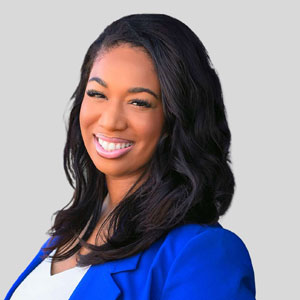Seneka Gainer, PhD, LPC-S, LMFT, NCC

Assistant Professor
Jacksonville University
ACA is a community of diverse, vibrant counselors and educators who are changing lives and the world at large. Meet Seneka Gainer, who has incorporated her clinical experience into training aspiring counselors.
What is the biggest challenge facing the mental health field today?
The primary hurdle in today's mental health landscape is ensuring widespread, fair access to care. Barriers like stigma and financial limitations impede individuals from seeking vital mental health support, compounded by heightened demand due to societal pressures. Bridging this gap necessitates destigmatization, cost reduction, telehealth expansion, and robust education. Simultaneously, a lack of empathy poses a significant challenge. Counselors and educators are vital in addressing this issue by integrating empathy-centric practices. Prioritizing empathy in training and practice fosters a more understanding mental health environment, which is pivotal in supporting those in need and ensuring comprehensive care for all.
What do you think are the biggest misconceptions about counseling?
The most prevalent misconceptions about counseling involve perceptions of weakness or instability in seeking help, undermining its value. Another misconception is that counselors solely offer advice, disregarding their role in guiding self-discovery and empowering individuals. Additionally, some believe counseling is only for severe mental health issues, overlooking its effectiveness in addressing everyday challenges. Misconceptions about confidentiality, duration, and cultural relevance further hinder its acceptance. Dispelling these misconceptions involves promoting counseling as a tool for growth, emphasizing its confidentiality, diverse applications, and the strength it takes to seek guidance, ultimately fostering a more inclusive and supportive attitude towards mental health care.
What role do you think counseling plays in the delivery of mental health services in today's society?
Counseling is a cornerstone in delivering mental health services today, offering personalized support tailored to individual needs. It provides a safe space for exploring emotions, developing adaptive mechanisms, and fostering self-awareness. Counselors offer guidance, empowering individuals to navigate challenges and enhance mental well-being. In today's complex society, counseling goes beyond treating mental illness; it promotes preventive care, addresses societal stressors, and embraces diverse perspectives. Its holistic approach cultivates self-empowerment, resilience, and healthier communities, making counseling an indispensable component in the continuum of mental health care services.
What outside of counseling brings you joy? Tell us about your hobbies or outside interests.
Outside of counseling and counselor education, I am passionate about traveling, exploring new cultures, and experiencing different landscapes, which rejuvenates my spirit and broadens my perspectives. Spending quality time with my family, friends, and church community is also a cherished priority. Engaging in activities together, sharing laughter, and creating lasting memories bring immense joy. I also find relaxation and entertainment in watching movies across various genres. These hobbies provide leisure and serve as outlets for rejuvenation and personal enrichment, contributing to a well-rounded and fulfilling life beyond the counseling sphere.
If you’d like to share how ACA membership or participation has helped you along your career journey, please do!
ACA membership and participation have significantly shaped my career by providing invaluable connections with like-minded counseling professionals. Engaging within ACA circles has enabled discourse and active involvement in global decision-making processes that influence counselors. Through various platforms, I have had the privilege to offer feedback from diverse perspectives across different career phases: as a student, practitioner, and counselor educator. These opportunities have allowed me to contribute meaningfully to the counseling field, leveraging my multifaceted experiences to shape discussions and initiatives. ACA membership has fostered professional connections and empowered me to play an influential role in impacting counseling practices and education on a broader scale.
